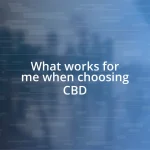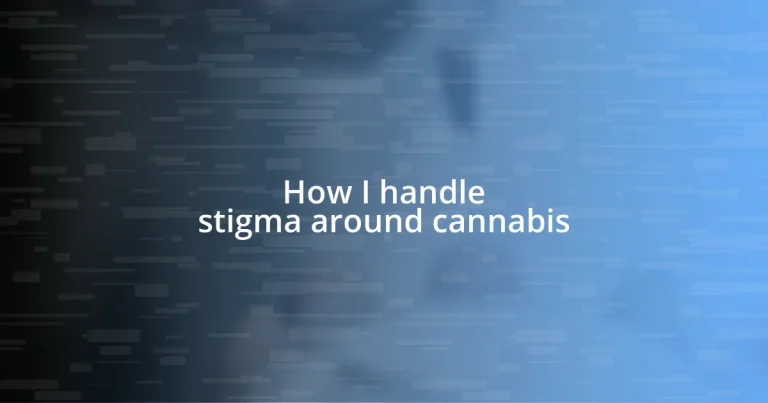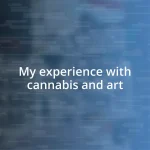Key takeaways:
- Sharing personal experiences with cannabis can shift perceptions and foster understanding, breaking down societal stigma.
- Open communication, education, and storytelling are essential in addressing misconceptions and creating compassionate dialogue about cannabis use.
- Building supportive networks, both in-person and online, is crucial for sharing experiences and finding community among those who face stigma related to cannabis.
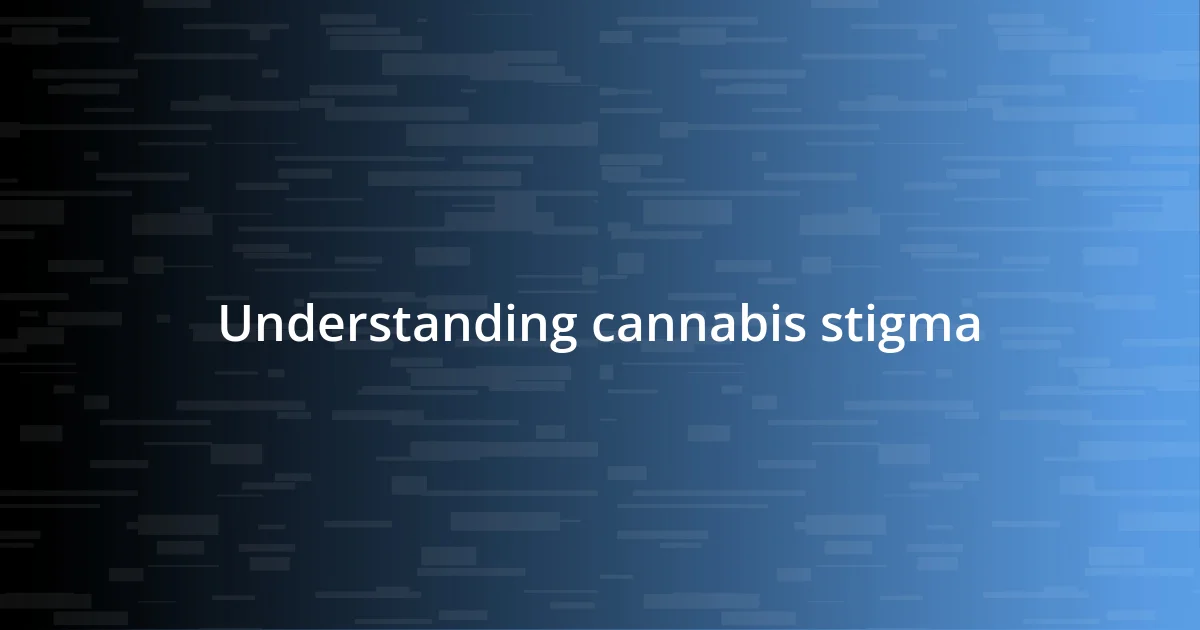
Understanding cannabis stigma
Cannabis stigma often stems from decades of misinformation and cultural biases. I remember my first encounter with this stigma when I openly discussed my use of cannabis for anxiety relief. The shock on my friends’ faces was palpable, and it made me wonder—why does something perceived as a harmless plant elicit such strong reactions?
Many people carry a preconceived notion that cannabis use is equivalent to irresponsible behavior or criminality. This viewpoint surprised me during a family gathering when a relative dismissed my experiences with cannabis as simply indulgent. I felt a mixture of disappointment and frustration; it made me question how deeply entwined these stereotypes were in our conversations about mental health and wellness.
It’s not just a matter of personal choice; cannabis stigma often reflects broader societal attitudes toward mental health and wellness treatments. I found myself asking—how can we shift this narrative? By sharing our own experiences and challenging misconceptions, we can foster a more informed and compassionate dialogue around cannabis, one that embraces understanding rather than judgment.
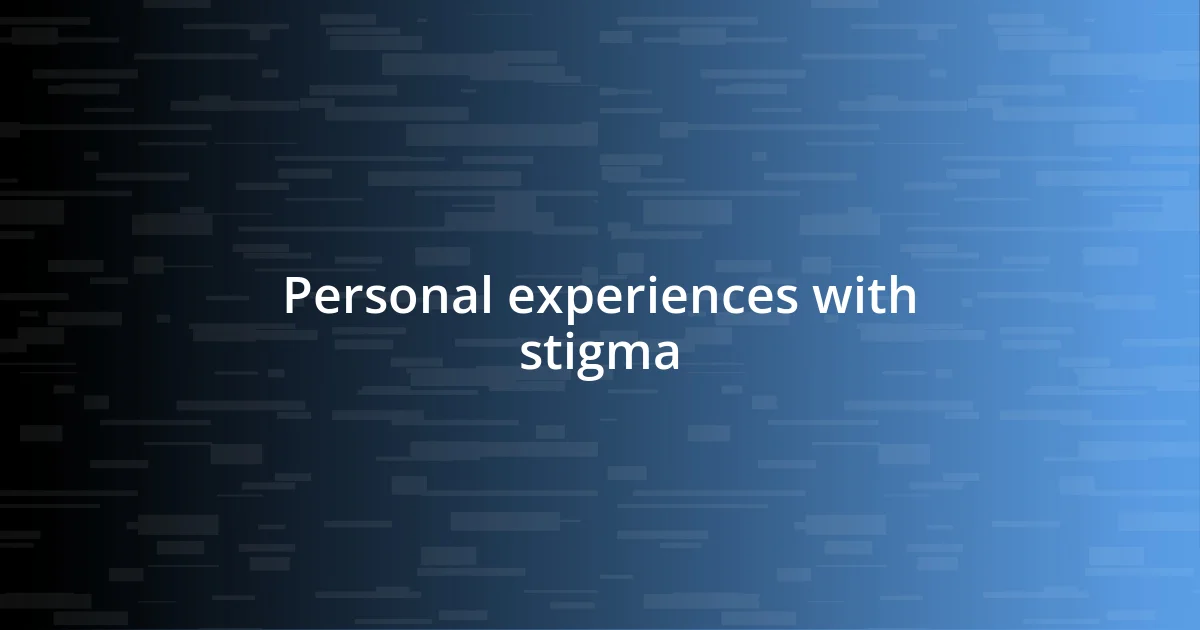
Personal experiences with stigma
The first time I faced stigma was during a conversation with a colleague. I shared that cannabis had significantly improved my focus and reduced my stress. Her reaction shocked me; she recoiled as if I’d said I was going to commit a crime. That moment stayed with me, highlighting how deeply ingrained the prejudices surrounding cannabis can be.
At another point, I had a heart-to-heart with a childhood friend who expressed concern over my cannabis use. She equated it to a slippery slope towards addiction. I felt a wave of sadness wash over me, realizing that despite my carefully considered approach, her perception was clouded by fear and misconceptions. It was a stark reminder of how vital education and open conversations are in breaking down these barriers.
I also remember attending a wellness retreat where cannabis was a focal point for discussion. Sharing my positive experiences, I was met with both curiosity and skepticism. Some attendees were drawn in and eager to learn, while others distanced themselves, reflecting societal divisions. This experience reinforced my belief that personal narratives can challenge stigma, creating a bridge between understanding and acceptance.
| Experience | Reaction |
|---|---|
| Colleague Conversation | Shock and recoil |
| Friend Concern | Sadness and fear |
| Wellness Retreat | Curiosity vs. skepticism |
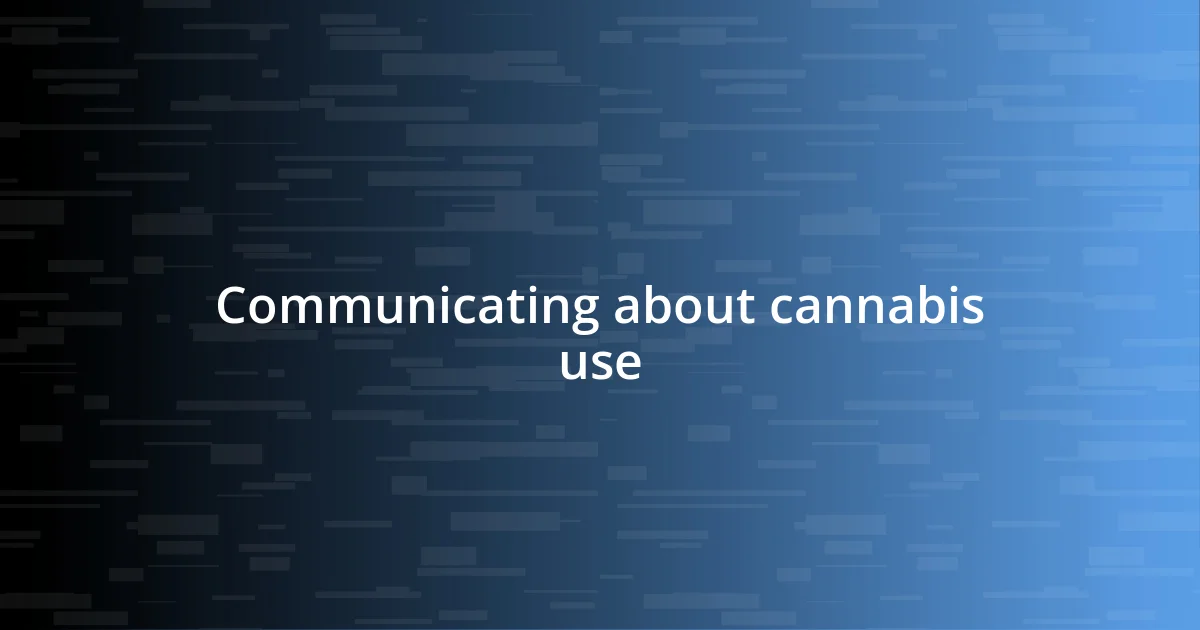
Communicating about cannabis use
Communicating openly about cannabis use can be both rewarding and daunting. I remember a time when I visited a family member who had been curious about my cannabis use. Instead of shying away from the topic, I shared how it helps manage my anxiety. Seeing their initial hesitance melt away into interest felt gratifying. It’s incredible how a simple conversation can start to unravel years of stereotype-laden thinking.
When talking about cannabis, here are a few tips that have helped me navigate these discussions:
- Be Honest: Share your personal journey, focusing on how cannabis has positively impacted your life.
- Listen Actively: Pay attention to the other person’s concerns, as this shows respect and openness.
- Educate Gently: Offer factual information that counters common misconceptions without coming off as confrontational.
- Emphasize Benefits: Highlight the therapeutic aspects of cannabis, linking them to broader wellness discussions.
- Stay Calm: Maintain a relaxed demeanor; your attitude can influence the conversation’s tone.
I find these strategies not only ease the stigma but also foster deeper conversations about mental health and self-care. Just like any relationship, the key lies in mutual understanding and respect.
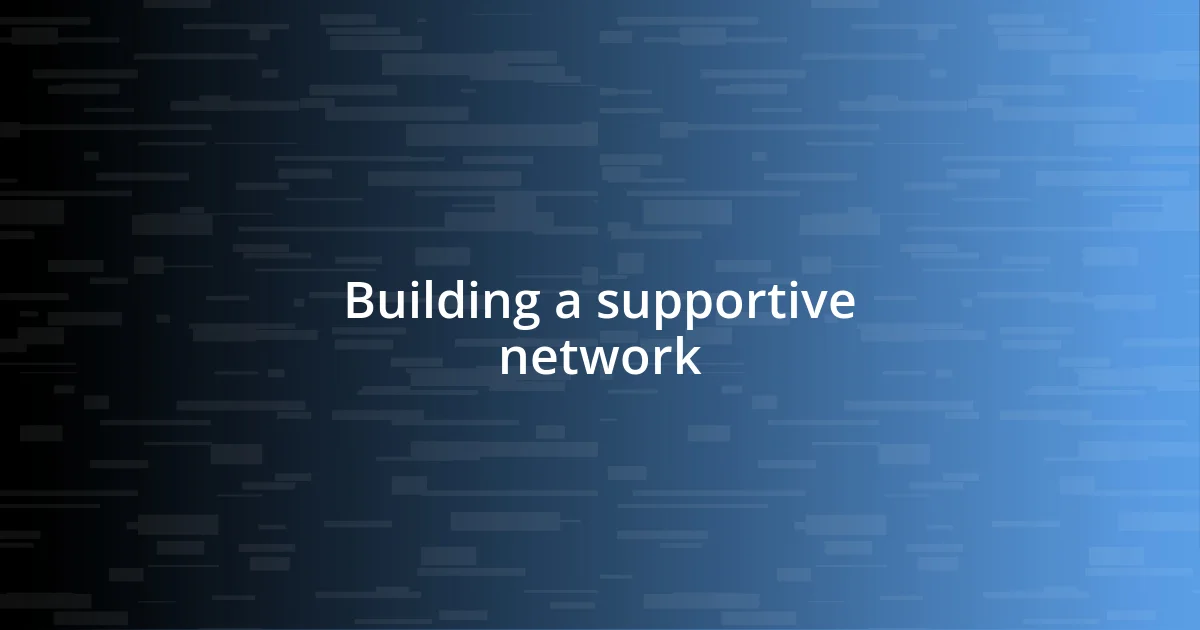
Building a supportive network
Building a supportive network around cannabis use has been a game changer for me. I recall meeting a small group of like-minded individuals at a local wellness event. Sharing stories in that safe space felt liberating; it was as if we were lifting the weight of stigma off our shoulders together. Have you ever experienced that moment where you just knew you were understood? It’s exhilarating.
One experience that stands out was when I confided in my old college roommate about my cannabis use after years of silence. To my surprise, she shared her own journey—her struggles with anxiety and how she found solace in cannabis too. This revelation showed me just how essential it is to connect with others who share similar experiences. It’s moments like these that remind me we’re not alone in facing stigma.
I also discovered the power of online communities dedicated to cannabis education and acceptance. Engaging with others virtually allowed me to exchange insights, ask questions, and gain broader perspectives. I’ve learned that when we come together, we can uplift and support each other, making it easier to break down the walls of misunderstanding surrounding cannabis use. Isn’t it comforting to know that there are people out there who genuinely get it?
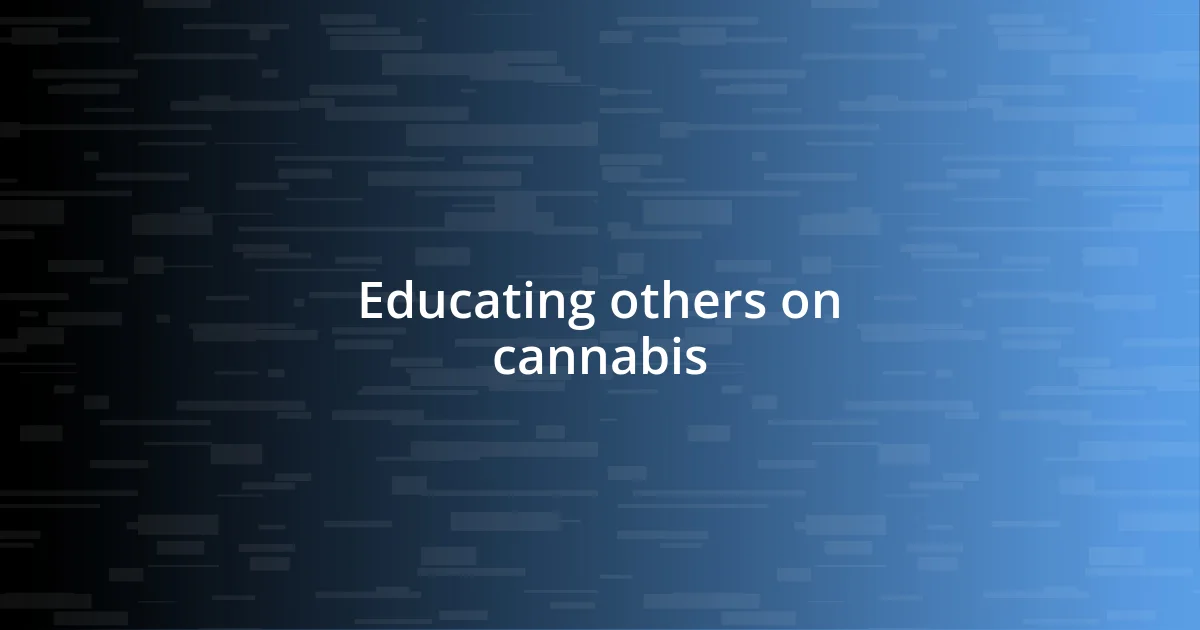
Educating others on cannabis
When I first started sharing my thoughts on cannabis, I was surprised by how many people were genuinely curious. I once held an informal gathering with friends, where I shared my experiences while preventing any heavy judgment from clouding the discussion. Seeing my friends lean in with interest and ask thoughtful questions made me realize that many simply lack the right information. It felt empowering to clear the air and replace stereotypes with honest conversations.
I often find that using analogies can really help bridge understanding. When I explain cannabis, I often compare it to something more familiar, like herbal remedies. Many people can relate to using common herbs for wellness, so drawing connections to cannabis through this lens makes the topic less intimidating. Have you ever noticed how people respond positively when they can connect something new to something they already know? It’s a small yet impactful technique that invites open-mindedness.
Moreover, sharing research findings can be a great way to enlighten skeptics. I remember presenting a few studies at a community event that highlighted the medicinal benefits of cannabis. As I explained how certain compounds can alleviate chronic pain or anxiety, I could see some faces soften and the reluctance fade. It’s a beautiful moment when people shift from skepticism to curiosity. Isn’t it fascinating how information can shift perspectives and spark meaningful dialogue about cannabis?
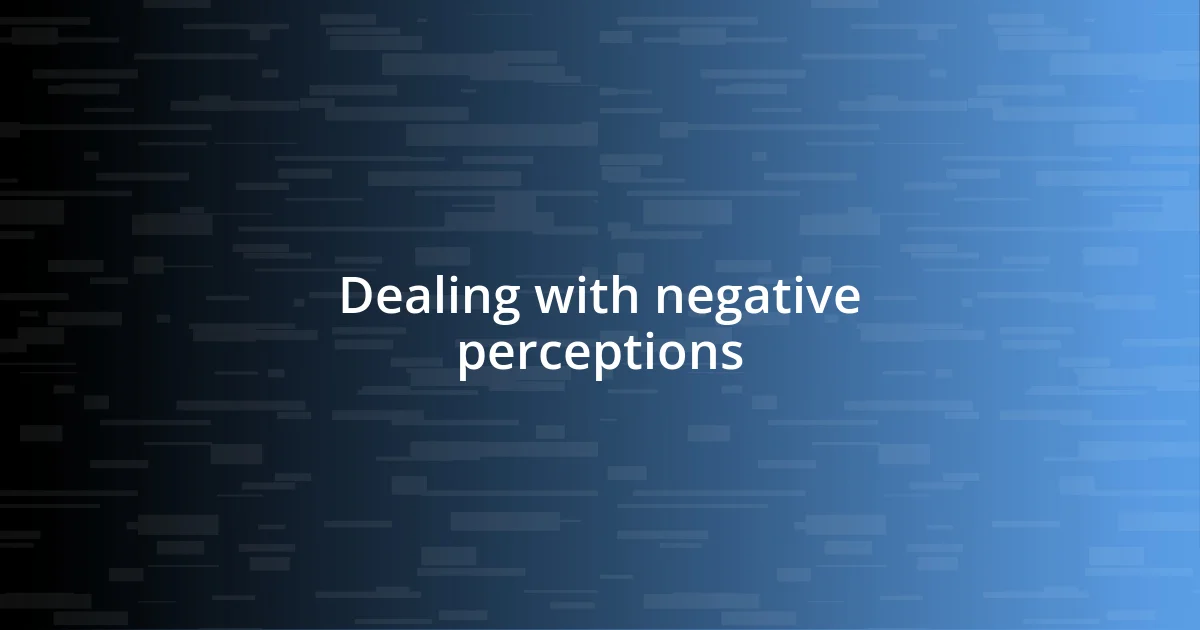
Dealing with negative perceptions
Facing negative perceptions about cannabis can be incredibly challenging. I remember attending a family gathering where the topic of cannabis came up unexpectedly. The looks on some relatives’ faces—mixed with confusion and concern—were palpable. I felt an urge to defend my choices, yet I knew reacting defensively wouldn’t help. Instead, I took a breath and began to share my perspective, explaining how cannabis serves as a tool for my well-being. Have you ever been in a similar situation where you felt you had to justify your choices?
Navigating conversations about cannabis can sometimes feel like walking a tightrope. I find that humor can diffuse tension, especially when the room is heavy with judgment. When someone jokingly referred to cannabis as just a “gateway drug,” I responded with a light-hearted quip about how I prefer to think of it as a “gateway to relaxation.” Laughter not only eased that delicate moment but also opened the door for a more balanced discussion. Have you ever noticed how humor can turn a potentially awkward moment into an opportunity for dialogue?
I’ve also discovered the power of sharing personal stories as a way to dismantle stigma. During a casual chat with a friend about stress, I opened up about my experience using cannabis to manage anxiety. Her surprise quickly shifted to understanding as she shared how she coped with her own struggles. It was a turning point; in that moment, I realized that connecting through vulnerability creates a more accepting space. Isn’t it interesting how our personal journeys can transform perceptions, one conversation at a time?
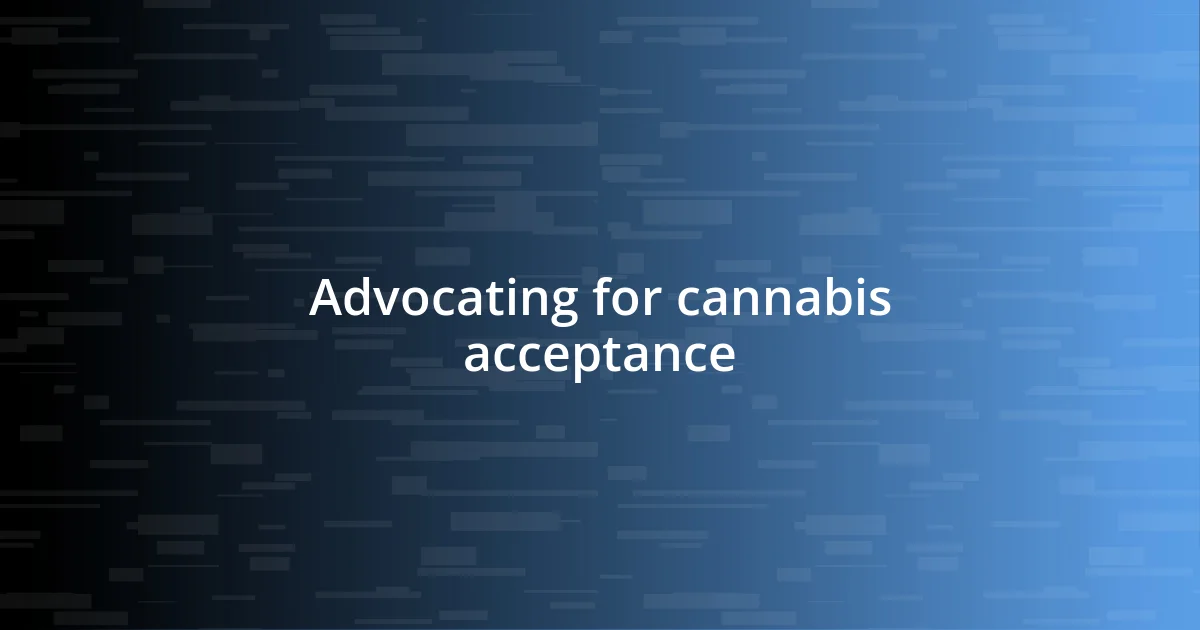
Advocating for cannabis acceptance
Advocating for cannabis acceptance has been a journey of both learning and unlearning for me. I vividly recall a community meeting where I was invited to speak about my advocacy. With my heart racing, I shared stories of how cannabis has positively impacted my life, from easing chronic pain to fostering creativity. Seeing the nods of understanding from members in the audience took me by surprise—it’s moments like these that make me realize how powerful sharing personal experiences can be. Have you ever felt that rush of connection when you share something deeply personal?
It’s essential to create a safe space for discussions about cannabis, allowing people to express their fears and misconceptions. I once hosted an open forum at my local library, where individuals from all walks of life shared their views. One participant expressed fear that cannabis could lead to addiction. Rather than dismiss their concern, I highlighted research showing that only a small percentage of users experience dependency issues. This acknowledgment not only validated their feelings but also opened the door to deeper conversations about responsible use. Isn’t it incredible how addressing fears can pave the way for enlightening discussions?
Another moment that stands out for me was during a workshop where I facilitated a discussion on cannabis and mental health. Someone shared their own struggles with anxiety and how societal stigma had prevented them from exploring alternative treatments. I watched as their demeanor shifted with every shared story; it reminded me that we all have the power to inspire change. It’s about fostering an environment of respect and openness that challenges outdated views. Could it be that sharing our vulnerabilities is the key to dismantling stigma once and for all? I truly believe that every conversation counts in this pursuit of acceptance.
